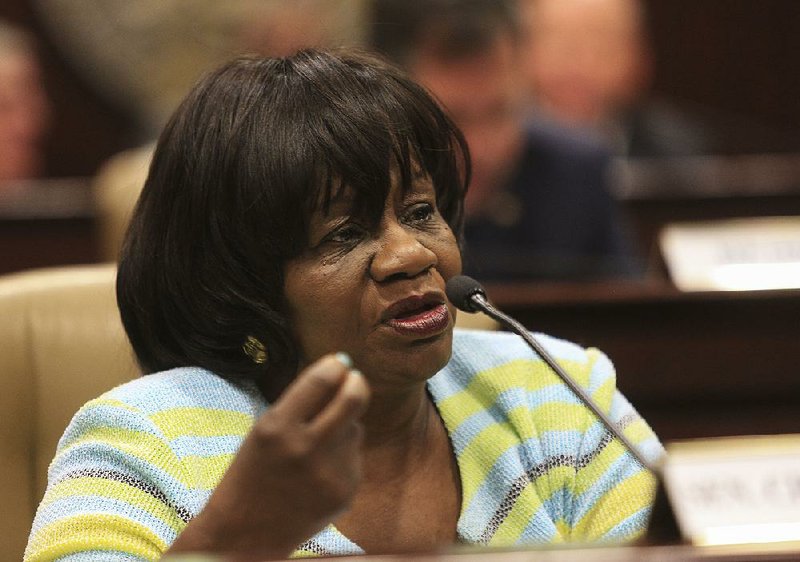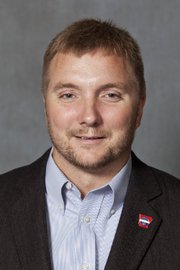The Arkansas Legislative Council voted Friday to triple the $50,000 budget for paying per diem and mileage to lawmakers attending meetings of the tax-overhaul task force, including some who are not members of the task force.
In a voice vote with a few lawmakers voicing their dissent, the council approved its Policy-Making Committee's recommendation from Tuesday to increase to $150,000 the allocation of Bureau of Legislative Research funds for per diem and mileage for the Arkansas Tax Reform and Relief Legislative Task Force. The allocation is for fiscal 2018, which started July 1.
During the council's meeting Friday, Rep. Josh Miller, R-Heber Springs, questioned why the task force needs more money.
A Policy-Making Committee co-chairman, Sen. Linda Chesterfield, D-Little Rock, explained that numerous lawmakers who are not on the task force attend its meetings, because "we are dealing with tax relief for the state and there seems to be great interest in that subject."
"We've already spent about half of what was already allocated," she said.
Lawmakers have been paid a total of about $30,000 in per diem and mileage for attending the 16-member task force's meetings since May, according to Bureau of Legislative Research records.
For example, 11 task force members were paid for attending the July 11 meeting, while 26 nonmembers also were paid for attending that meeting, bureau records show.
The per diem rate for lawmakers who live more than 50 miles from the state Capitol increased from $153 to $155 on Oct. 1, while the reduced per diem paid to those who live within 50 miles of the state Capitol is $59, according to Bureau of Legislative Research Director Marty Garrity.
The mileage rate for lawmakers driving to legislative meetings is 53.5 cents a mile. Lawmakers are paid per diem and mileage in addition to their annual salaries of $40,188 for all lawmakers except the House speaker and Senate president pro tempore, who are paid an annual salary of $45,900 a year.
Chesterfield told lawmakers that "we've got a choice" regarding the proposal to increase the task force's budget by $100,000.
"We can say to [General] Assembly members who are not on the committee, 'Don't come. Don't find out what we are talking about,' or we can do as we did with health reform [task force] and accommodate them by enlarging the budget," she said. Lawmakers who attended the Legislature's health care overhaul task force meetings were paid a total of $125,293.11 in fiscal 2016 and then $29,708.70 in fiscal 2017, according to Bureau of Legislative Research records.
That led Miller to ask, "Is there any rule against coming, even if we don't get paid?"
Chesterfield said, "There may not be a rule, but that certainly is not the practice. When you come from hundreds of miles, you kind of want to at least get paid for a meal.
"But I think each of us represents a constituency base that is directly impacted ... as to whether or not we will engage in tax reform, which seems to be the flavor of the month, and I think it is important then that they have their voices heard because it is not something that is just within the purview of the [task force] itself," she said.
Chesterfield said the increased allocation of $100,000 would not be used to pay the consultant hired by the task force.
The Legislative Council has hired Philadelphia-based PFM Group Consulting under a contract for up to $312,750 through Dec. 31, 2018, with an option to renew the contract for six more months. PFM Director Randall Bauer is the firm's point person in Arkansas. He served as budget director from 1998-2005 under then-Iowa Gov. Tom Vilsack, a Democrat.
The task force is required to issue a final report by Sept. 1, 2018, in advance of the 2019 regular session.
The tax-overhaul task force was created by Acts 78 and 79 during this year's regular session partly to placate lawmakers who favor more income-tax cuts, particularly for Arkansans who earn more than $75,000 a year, where the top tax bracket starts. The top bracket's highest rate is 6.9 percent.
Under the laws that created the task force, the Republican-controlled Legislature approved Republican Gov. Asa Hutchinson's plan to cut individual income-tax rates for Arkansans who earn less than $25,000 a year in taxable income. That plan is projected to reduce general revenue by about $25 million in fiscal 2019 because it takes effect Jan. 1, 2019, the middle of the fiscal year, and then $50 million each year thereafter.
Another cut, approved in 2015, reduced income-tax rates for those making between $21,000 and $75,000 a year. That tax cut was projected to reduce general revenue by about $100 million a year starting in fiscal 2017.
Hutchinson has said that he ultimately would like to see the state's top income tax rate be 5 percent, but it could take a while to do that. Reducing the top rate in the two highest income-tax brackets would reduce state general revenue by about $346 million, according to Department of Finance and Administration spokesman Scott Hardin.
Earlier this month, a co-chairman of the tax-overhaul task force, Sen. Jim Hendren, R-Sulphur Springs, said he would consider $100 million to be a "starting point" for discussions of future tax cuts that may be phased in over time, depending on the level of tax cuts.
In his weekly column released Friday, Hutchinson wrote, "I am not done cutting taxes.
"Even as I speak, the legislature's Tax Reform and Relief Task Force is analyzing state spending and looking for ways to lessen the burden on taxpayers," the governor wrote. "My goal is to lower the income tax rate to a competitive rate in order to let hard-working Arkansans keep more of their hard-earned money."
Hendren has repeatedly told fellow lawmakers that the task force will focus on tax relief and a tax overhaul -- not state spending -- and that reviewing spending is the responsibility of the Joint Budget Committee and the Legislature as a whole.
Asked whether the task force is now going to consider state spending in light of Hutchinson's written remarks, Hendren said Friday that the law that he sponsored that created the task force is very clear that the task force is going to focus on making the state tax code simple and fair and and lessening the tax burden on Arkansans.
"We are not a budget committee," said Hendren, whose uncle is the governor.
Hendren added that he understands mathematics and the Legislature eventually will have to cut spending to cut taxes "unless we have tremendous surpluses" in the future.
A Section on 10/21/2017


